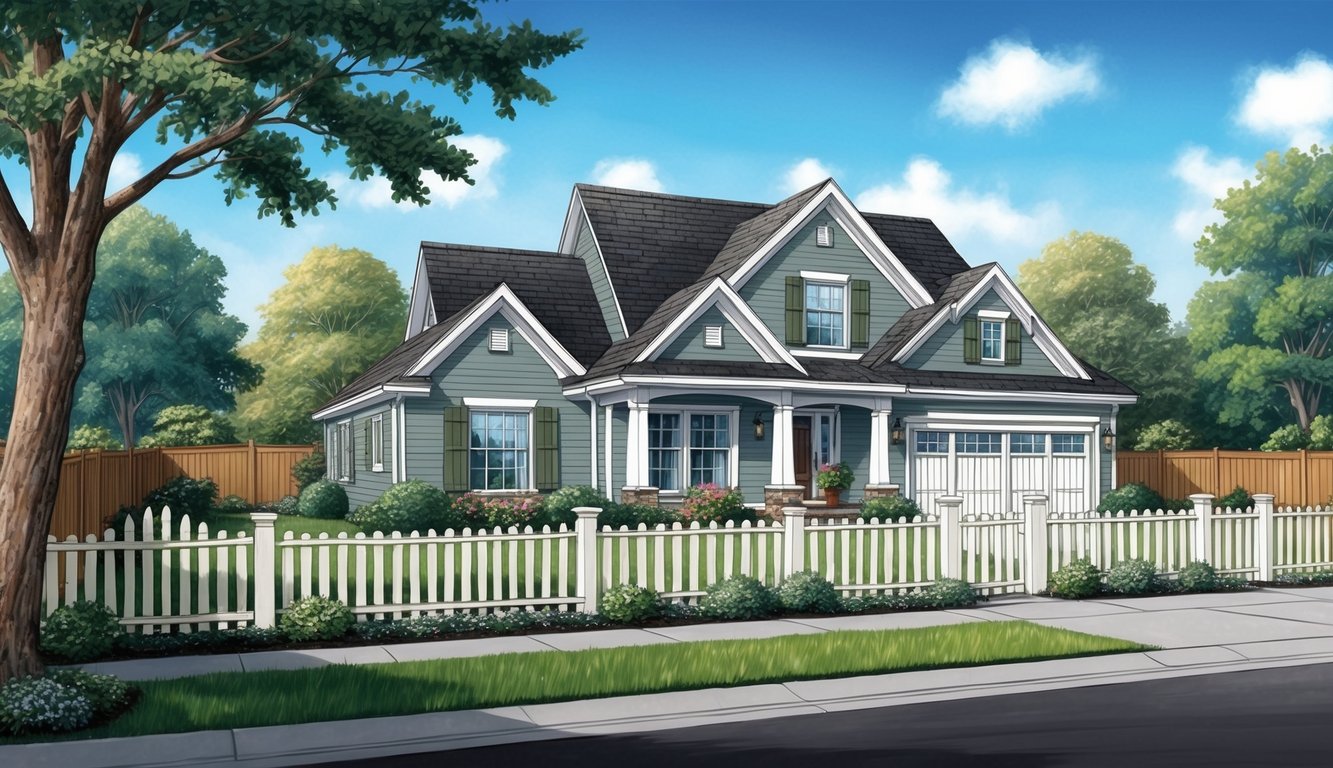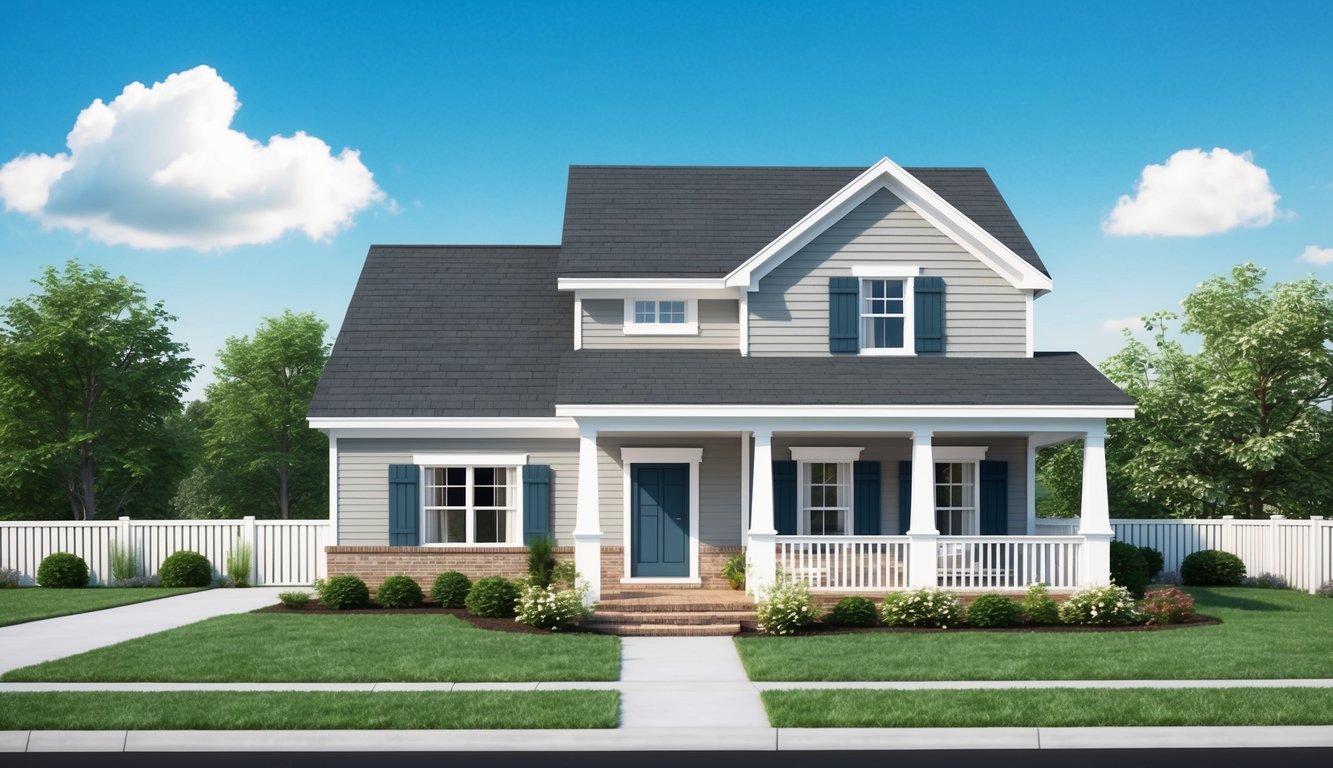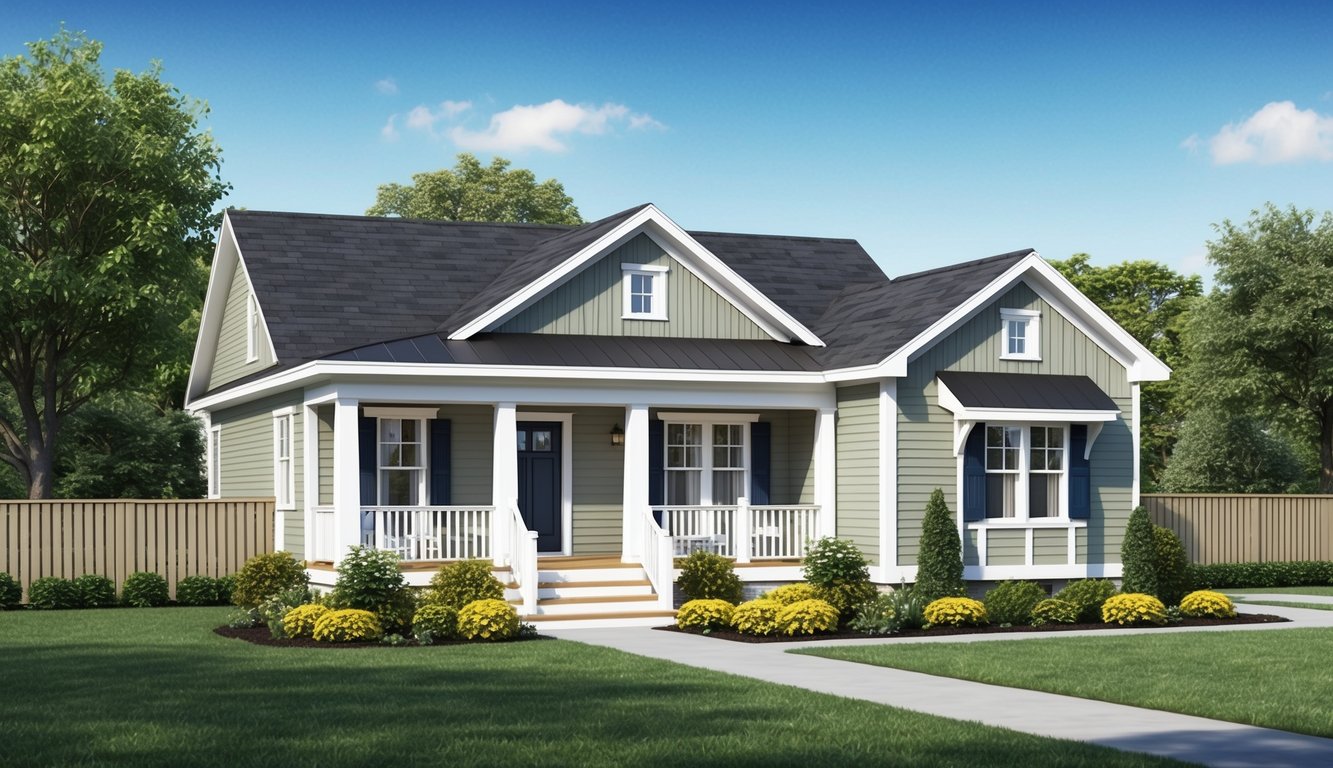Purchasing your first home is an exciting milestone, but it also comes with new responsibilities.
One crucial aspect of homeownership is securing the right insurance policy to protect your investment.
With numerous options available, finding the best coverage can be overwhelming for new homeowners.
The top home insurance policies for first-time buyers offer comprehensive coverage, competitive rates, and excellent customer service. These policies often include protection for your dwelling, personal property, liability, and additional living expenses.
By comparing different providers and their offerings, you can find a policy that fits your specific needs and budget while giving you peace of mind in your new home.
1) State Farm Homeowners Insurance
State Farm offers comprehensive homeowners insurance coverage for new homeowners.
Their policies protect your dwelling, personal property, and provide liability coverage.
You can customize your policy with additional options to suit your specific needs.
State Farm’s standard coverage includes protection against fire, theft, and weather-related damages.
The company is known for its extensive network of local agents.
This allows you to have personalized service and support when filing claims or making policy changes.
State Farm provides several discounts to help you save on premiums.
These may include multi-policy discounts, home security system discounts, and claim-free discounts.
You can easily get a quote online or through a local agent.
The process is straightforward and allows you to compare different coverage options.
State Farm has received positive ratings for customer satisfaction.
They scored 4.5 out of 5 in U.S. News’ best homeowners insurance companies review.
The company offers a user-friendly mobile app and online portal.
These tools make it convenient for you to manage your policy, pay bills, and file claims.
State Farm has partnered with ADT to offer smart-home technology.
This can help you protect your home and potentially reduce your insurance costs.
2) Allstate Homeowners Insurance
Allstate offers comprehensive home insurance policies tailored for new homeowners.
Their coverage includes protection for your dwelling, personal property, and liability.
Allstate’s policies feature dwelling coverage and personal umbrella insurance to safeguard your home and assets.
You can customize your policy to fit your specific needs.
One standout feature is Allstate’s mobile app, which allows you to manage your policy and file claims easily.
The app provides a user-friendly interface for accessing your insurance information on the go.
Allstate provides various discounts to help you save on your premiums.
These may include multi-policy discounts if you bundle your home and auto insurance.
The company’s home insurance rates are competitive, with an average annual cost of $1,650 for a policy with $300,000 in dwelling coverage.
This makes Allstate about 13% cheaper than the national average.
Allstate offers optional coverages to enhance your policy.
These may include protection for valuable items, identity theft restoration, and water backup coverage.
You can easily get a quote online or through an Allstate agent.
The company’s website provides detailed information about their coverage options to help you make an informed decision.
3) Liberty Mutual Home Insurance
Liberty Mutual offers customizable homeowners insurance to protect your home and belongings.
You can tailor your coverage to fit your specific needs and budget.
The company provides standard protection against common perils like fire, theft, and weather damage.
You can also add extra coverage for valuables, water backup, and inflation protection.
Liberty Mutual’s policies include additional living expenses if you can’t stay in your home due to a covered event.
This can help with temporary housing costs while your home is being repaired.
You may qualify for discounts by bundling your home and auto insurance or installing protective devices.
Liberty Mutual also offers a discount for new homebuyers.
The insurer has a mobile app that allows you to manage your policy, pay bills, and file claims.
This can make it convenient to handle insurance matters on the go.
While Liberty Mutual is a large, established company, it’s worth noting that their customer satisfaction ratings are slightly below average compared to some competitors.
When considering Liberty Mutual, you should compare quotes with other insurers to ensure you’re getting the best value for your needs.
Remember to review the policy details carefully before making a decision.
4) USAA Homeowners Insurance
USAA offers quality coverage and award-winning service for homeowners insurance.
Their policies are designed to protect your house and belongings from common risks like fire, theft, and vandalism.
One standout feature is USAA’s Wildfire Response program, which can help safeguard your home from active wildfires in eligible states.
If you live in a covered area and have an active policy, certified firefighters may be dispatched to prevent losses during wildfire threats.
USAA homeowners insurance is known for its competitive pricing.
The average monthly cost is $193.44 for a policy with $300,000 in dwelling coverage and $100,000 in liability coverage.
This rate is often lower than many competitors.
You’ll find that USAA’s annual premiums are generally below the national average.
Their rates typically come in at $1,875 per year, compared to the national average of $1,915.
It’s important to note that USAA insurance is exclusively available to military members, veterans, and their families.
If you qualify, you can benefit from their specialized coverage options and competitive rates.
When comparing home insurance providers, USAA consistently ranks high for customer satisfaction.
Their policies offer comprehensive protection tailored to the unique needs of military families.
5) Amica Mutual Home Insurance

Amica Mutual offers comprehensive home insurance policies tailored for new homeowners.
You can choose between two main types of coverage: the HO3 and HO5 policies.
The HO5 policy provides broader coverage for your personal property.
When you opt for Amica, you’ll find various additional coverage options to enhance your protection.
These include dwelling replacement coverage, which provides an extra 30% to repair or rebuild your home if costs exceed your policy limit.
Amica also offers personal property replacement coverage, ensuring full replacement of your belongings worldwide if they’re damaged in a covered loss.
You can also add water backup and sump overflow protection to your policy.
One unique feature of Amica is its dividend policies.
In some cases, you may be eligible to receive a portion of your premium back as a dividend, potentially reducing your overall insurance costs.
Customer satisfaction is a strong point for Amica.
The company ranked above average in J.D. Power’s 2024 home insurance study.
It also receives very few consumer complaints for a company of its size, indicating a high level of customer service.
Amica’s history dates back to 1907 when it was founded as the Automobile Mutual Insurance Co. of America.
The company expanded into homeowners insurance in 1956, bringing decades of experience to its current offerings.
6) Farmers Home Insurance

Farmers Insurance offers a comprehensive homeowners insurance policy tailored for new homeowners.
Founded in 1928, the company has established itself as a reliable provider serving millions of households.
When you choose Farmers, you’ll have access to their Smart Plan options.
These plans allow you to customize your coverage based on your specific needs and budget.
Farmers provides standard coverage for your dwelling, personal property, and liability.
You can also add optional coverages to enhance your protection.
The company offers various discounts to help you save on premiums.
These may include multi-policy discounts, home safety features, and claims-free discounts.
Farmers’ website provides educational resources to help you understand homeowners insurance.
You can learn about coverage types and get tips on how to protect your home.
The company’s user-friendly online platform allows you to get a free quote and manage your policy easily.
You can also work with a local agent for personalized service.
Farmers’ claims process is straightforward, with options to file claims online or through their mobile app.
Their customer service is available 24/7 to assist you with any questions or concerns.
7) Nationwide Homeowners Insurance

Nationwide offers comprehensive homeowners insurance policies tailored for new homeowners.
Their coverage includes protection for your dwelling, personal property, and liability.
You can customize your policy with additional options like Brand New Belongings® and Better Roof Replacement®.
These features provide extra value and peace of mind for your home investment.
Nationwide’s average annual premium is $2,270, which is higher than the national average.
However, you may qualify for discounts that can lower your costs.
You can easily get a quote online or speak with a local agent to explore your options.
Nationwide’s agents can help you understand the coverage details and find the best policy for your needs.
The company also offers a user-friendly mobile app for managing your policy and filing claims.
This convenience can be especially helpful for busy new homeowners.
Nationwide’s financial stability and long-standing reputation in the insurance industry make it a reliable choice for protecting your home.
They have consistently high ratings from major credit rating agencies.
While Nationwide may not be the cheapest option, their extensive coverage options and add-ons can provide valuable protection for your new home.
Consider getting quotes from multiple insurers to compare prices and coverage before making your decision.
8) Chubb Home Insurance

Chubb offers comprehensive homeowners insurance tailored for high-value homes.
Their policies come standard with generous coverage features that many other insurers charge extra for.
You’ll find extended replacement cost coverage included, which helps protect you if rebuilding costs exceed your policy limits.
Chubb also provides cash settlements, allowing you to rebuild elsewhere or pocket the money if you choose not to rebuild.
HomeScan is a unique service offered to Chubb clients.
It can detect potential issues like leaks or missing insulation before they become major problems.
Chubb’s policies also include coverage for unexpected situations.
This ranges from tree removal after storms to restoration of electronic data destroyed by computer viruses.
You can benefit from Chubb’s multi-policy discount.
Combining your home insurance with other policies like auto or life insurance can reduce your costs by up to 10%.
While Chubb’s premiums tend to be higher than average, their customers report very few complaints.
This suggests a high level of satisfaction with the company’s service and claims handling.
If you own a high-value home and prioritize comprehensive coverage and excellent customer service, Chubb could be an excellent choice for your homeowners insurance needs.
9) Progressive Homeowners Insurance

Progressive offers competitive rates for homeowners insurance.
Their policies cover standard protections like dwelling coverage, personal property, and liability protection.
You can customize your policy with additional coverages.
These may include water backup, personal injury, and identity theft protection.
Progressive also provides several discounts to help lower your premiums.
You might qualify for savings by bundling policies, installing security systems, or having a new home.
The company’s website offers an easy-to-use quote tool for getting estimates quickly.
You can also manage your policy and file claims online or through their mobile app.
Progressive partners with other insurers to underwrite their policies.
This means your coverage and claims experience may vary depending on your location.
One potential drawback is the lack of increased dwelling coverage options.
This could be a concern if you live in an area prone to natural disasters.
Customer service reviews for Progressive are mixed.
Some homeowners report positive experiences, while others mention challenges with claims processing.
Progressive also offers a unique home quote explorer tool.
This allows you to compare rates from multiple insurers side-by-side, potentially helping you find the best deal.
10) Travelers Home Insurance

Travelers offers comprehensive home insurance policies tailored for new homeowners.
Their coverage includes protection for your dwelling, personal property, and liability.
Travelers also provides various discounts to help you save on premiums.
You can bundle your home and auto policies for additional savings.
The company offers customizable coverage options.
You can add extra protection for valuable items or increase limits for specific perils.
Travelers has a strong financial rating, receiving an A++ from AM Best.
This indicates their ability to pay out claims reliably.
Their policies cover standard risks like fire, theft, and weather-related damage. Additional coverage is available for events such as water backup or identity fraud.
You can easily manage your policy online or through their mobile app.
Filing claims and tracking their progress is straightforward with these digital tools.
Travelers also provides resources to help you understand homeowners insurance.
They offer guides on topics like buying and insuring your new home.
Keep in mind that Travelers’ rates may be higher compared to some competitors. Forbes Advisor reports that their average premiums are on the higher end among top insurers.
Customer service is available 24/7, ensuring you can get assistance whenever you need it.
This can be particularly helpful for new homeowners unfamiliar with insurance processes.
Understanding Home Insurance Policies
Home insurance policies provide crucial financial protection for homeowners.
They cover a range of risks and offer various types of coverage to safeguard your property and assets.
What Is Home Insurance?
Home insurance is a contract between you and an insurance company that protects your home and belongings from covered perils.
It typically includes dwelling coverage, personal property protection, and liability insurance.
Your policy also covers additional living expenses if your home becomes uninhabitable due to a covered event.
Home insurance is often required by mortgage lenders.
Even if not mandatory, it’s a wise investment to protect your most valuable asset.
Policies can be customized to fit your specific needs and budget.
Types of Coverage
Home insurance policies offer several types of coverage:
- Dwelling Coverage: Protects the structure of your home
- Other Structures Coverage: Covers detached structures like garages or sheds
- Personal Property Coverage: Insures your belongings
- Liability Protection: Covers legal expenses if someone is injured on your property
- Additional Living Expenses: Pays for temporary housing if your home is uninhabitable
The amount of coverage you need depends on factors like your home’s value, location, and personal assets.
It’s important to review and update your coverage regularly to ensure adequate protection.
Common Terms and Definitions
Understanding key terms helps you read and interpret your home insurance policy effectively:
- Premium: The amount you pay for insurance coverage
- Deductible: Your out-of-pocket expense before insurance kicks in
- Actual Cash Value: Replacement cost minus depreciation
- Replacement Cost: Cost to replace an item at current prices
- Endorsement: An addition or change to your policy
- Peril: A specific risk or cause of loss covered by your policy
Familiarize yourself with these terms to better understand your coverage and make informed decisions about your policy.
Don’t hesitate to ask your insurance agent for clarification on any confusing terms or concepts.
Factors to Consider When Choosing Home Insurance
Selecting the right home insurance policy requires careful evaluation of your property’s value, local risks, and financial considerations.
A thorough assessment of these factors will help you secure adequate coverage at a competitive price.
Assessing Your Home’s Value
Accurately determining your home’s value is crucial for proper insurance coverage. Create a detailed home inventory to estimate the worth of your belongings.
Include high-value items like jewelry or art.
Consider the cost to rebuild your home, not just its market value.
Factors like local construction costs and your home’s unique features impact this figure.
Don’t forget to account for outdoor structures like sheds or fences.
These are often covered under “other structures” in your policy.
Reassess your home’s value annually.
Renovations, market changes, and inflation can affect your coverage needs.
Understanding Your Area’s Risks
Your location plays a significant role in determining insurance needs and costs.
Research common natural disasters in your area, such as floods, earthquakes, or hurricanes.
Standard policies may not cover all risks.
You might need additional coverage for specific perils.
For example, flood insurance is often a separate policy.
Consider local crime rates and the likelihood of theft or vandalism.
Installing security systems can help mitigate these risks and may lead to premium discounts.
Your home’s proximity to fire stations and hydrants can affect rates.
Homes in rural areas might face higher premiums due to longer emergency response times.
Comparing Premiums and Deductibles
Balance your premium costs with your deductible.
A higher deductible typically results in lower premiums, but ensure you can afford the out-of-pocket expense in case of a claim.
Some insurers offer percentage-based deductibles.
For instance, a 2% deductible on a $100,000 policy would mean $2,000 out-of-pocket for a claim.
Compare quotes from multiple insurers.
Rates can vary significantly for the same coverage.
Look for bundling discounts.
Combining home and auto insurance with one company often leads to savings.
Consider the insurer’s financial stability and customer service ratings.
A lower premium isn’t always the best choice if the company has poor claim handling.
How to Maximize Your Home Insurance Benefits
Maximizing your home insurance benefits involves strategic choices and regular maintenance of your policy.
By taking a proactive approach, you can ensure comprehensive coverage while potentially reducing costs.
Bundling Insurance Policies
You can often save money by bundling multiple insurance policies with the same provider.
This typically includes combining your home and auto insurance, but may extend to life, boat, or other types of coverage.
Many insurers offer significant discounts for bundling, sometimes up to 25% off your premiums.
This approach not only saves you money but also simplifies your insurance management by dealing with a single company for multiple policies.
Consider requesting quotes for bundled policies from several insurers to compare savings.
Remember to evaluate the coverage quality alongside the price to ensure you’re getting the best overall value.
Taking Advantage of Discounts
Insurance companies offer various discounts that can substantially reduce your premiums.
Common discounts include:
- Safety features: Installing smoke detectors, security systems, or storm shutters
- Claims-free history: Maintaining a record without claims for a certain period
- New home discount: For recently built or renovated houses
- Loyalty discount: For long-term customers
- Payment discounts: For paying annually or setting up automatic payments
Ask your insurer for a complete list of available discounts.
You might be surprised by the savings opportunities you qualify for but haven’t claimed.
Regularly review your home’s safety features and upgrades.
Inform your insurer about any improvements that could earn you additional discounts.
Regularly Reviewing and Updating Your Policy
Your insurance needs change over time, making regular policy reviews crucial.
Set an annual reminder to review your homeowners insurance.
During your review, reassess your home’s value and rebuild costs.
Also, update your inventory of personal belongings and check if you need additional coverage for new valuables.
You should also evaluate your deductible.
A higher deductible can lower premiums if you can afford it.
Then, consider if you need additional coverage like flood insurance.
Be proactive in informing your insurer about significant changes to your home, such as renovations or additions.
This ensures your policy remains up-to-date and adequately covers your property.
Don’t hesitate to shop around and compare quotes from different insurers every few years.
This can help you find better rates or coverage options as your needs evolve.






